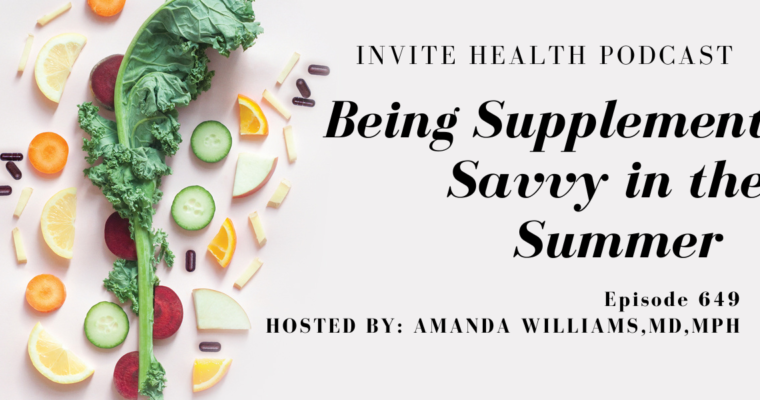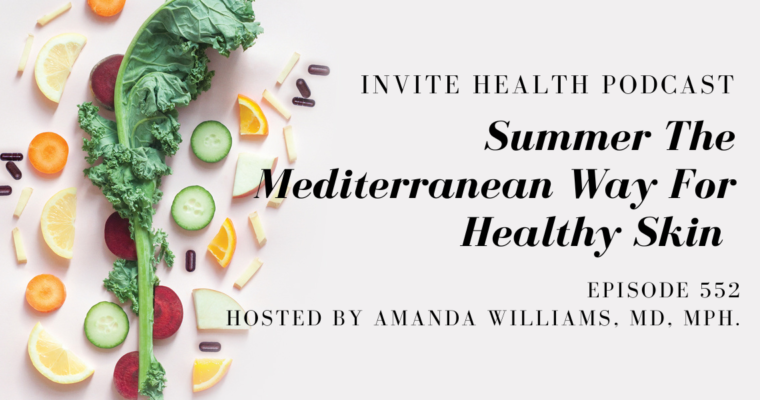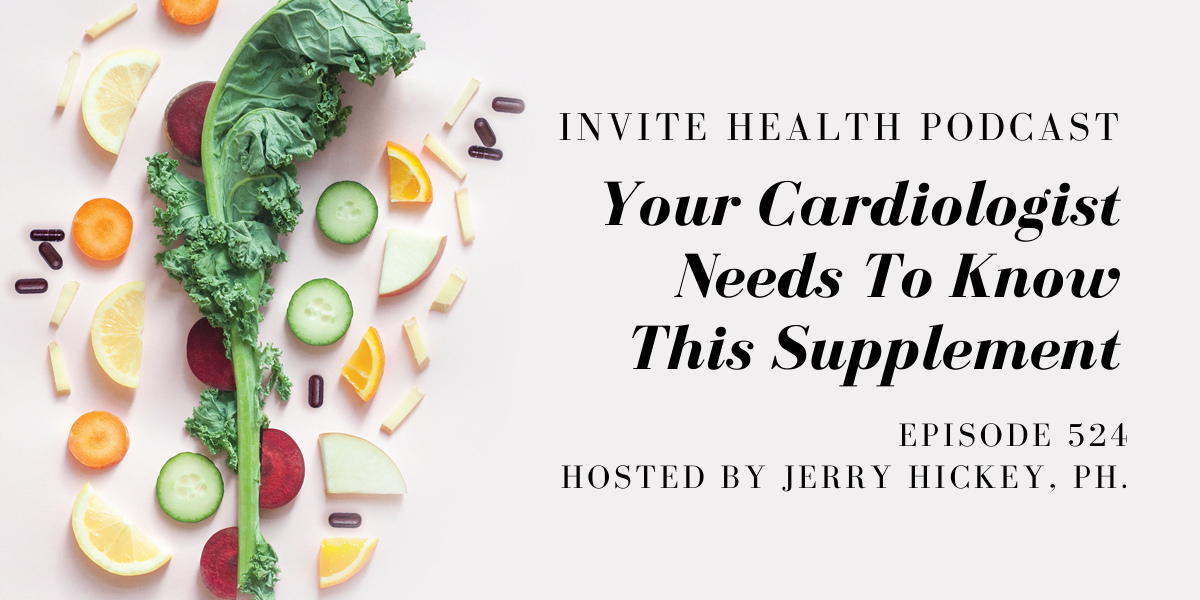cardiologist cardiologist
Subscribe Today!
Please see below for a complete transcript of this episode.
Your Cardiologist Needs To Know This Supplement – InViteⓇ Health Podcast, Episode 524
Hosted by Jerry Hickey, Ph.
*Intro music*
InViteⓇ Health Podcast Intro: Welcome to the InViteⓇ Health Podcast, where our degreed healthcare professionals are excited to offer you the most important health and wellness information you need to make informed choices about your health. You can learn more about the products discussed in each of these episodes and all that InViteⓇ Health has to offer at www.invitehealth.com/podcast. First time customers can use promo code PODCAST at checkout for an additional 15% off your first purchase. Let’s get started!
*Intro music*
Jerry Hickey, Ph.:
[00:00:41] Hi, Jerry Hickey here. Heart disease and high blood pressure are not a normal part of aging. What you eat, your diet, the amount of exercise you have or you don’t have, the exposure to pollutants such as bus exhaust and car exhaust, and your nutrient intake all affect your risk of developing or not developing heart disease and circulatory diseases. Now, of course, genes play a part. But as one researcher pointed out, genes only load the gun. It’s the environment which pulls the trigger. So the way you live matters.† [00:01:18]
[00:01:20] Now one risk factor for heart disease and heart issues, which is not commonly noted, is a low intake of magnesium, the mineral magnesium. Magnesium is very important to many processes that affect the entire body, but also your heart that affect your blood pressure, that affect your circulation, that affect your blood sugar levels. Yet, according to a large government survey, approximately 68% of Americans consume far too little magnesium from their diet. Now, this is important because magnesium has been found to affect your blood pressure in a good way, your cholesterol, your triglyceride levels, the rhythm of your heart, the way it beats, blood sugar levels, the energy, your heart… it requires to pump blood approximately 100,000 times per day. Now, all of this adds up to a very important need for the mineral magnesium to be looked at as something that’s important for the health of your heart. This is very important for cardiologists to take note of. Yet over my career, many decades as a pharmacist and a nutritionist, I’ve only seen two board certified cardiologists commonly recommend the mineral magnesium to their patients. And perhaps this needs to change, and I am starting a new series now looking at different practices, different specialties in medicine such as cardiologists and neurologists and diabetologist, etc. and what supplements may be core to the needs of their patients. What supplements specifically can help the lion’s share of their patients. So this is the first in a series of podcast episodes describing, in my opinion, and I’m very well read in these matter, the number one nutrient for each specialty of medicine. So welcome to Supplements and Your Doctor: Magnesium and Cardiology. So my name is Jerry Hickey. I’m a nutritional pharmacist. You can find all of our episodes for free wherever you listen to podcasts, all of our InViteⓇ episodes. But you can also follow us on Twitter, Instagram and Facebook @invitehealth. All of the information in this episode is linked at the podcast description. So let’s get going. By the way, at the end of this episode, I will tell you a good amount of magnesium for your daily needs. It’s slightly more in men than women. Of course, that depends on size also and the level of activity. I’ll tell you foods that supply magnesium. I’ll tell you my favorite supplements for magnesium. And then I’ll give you a brief description of other episodes I’m planning in this series.† [00:04:37]
[00:04:39] So magnesium is a macro mineral. There’s a lot of them calcium, potassium, sulfur. There’s a lot of macro minerals. These are minerals you need in higher levels. Micro minerals, you only need a tiny amount like copper or selenium, but macro minerals you need a good amount and magnesium plays a role in over 300 incredibly important reactions in our body. You need magnesium to create DNA, you need magnesium to create protein, you need magnesium for your muscles to function. Now your heart, of course, is a very important muscle that’s beating over 100,000 times a day, pumping blood up to your brain and down to your legs. Magnesium is very important for your heart. It’s important for nerve function. There’s many nerves associated with your heart. It’s needed to create bone and hold it together. It’s needed to activate Vitamin D. Now, Vitamin D itself is needed for the heart, but Vitamin D is also needed for your immune system, for your bones, for your brain health. You need magnesium to release melatonin and other neurotransmitters, and that’s incredibly important. Melatonin is needed for regulating nighttime blood pressure. Melatonin is needed for your immune system. Melatonin is needed to build bone. So I mean magnesium’s just like core to good health. You need magnesium for energy. Energy is made mostly out of the body processing sugar into something called ATP. ATP is stabilized by being attached to magnesium, so you need magnesium for energy and the heart, of course, eats up a great deal of energy. You also need magnesium to control your blood sugar. So magnesium is needed for your muscle energy and nerve functions, both of which are key to a properly functioning heart. So, I mean, that’s just a basic thing.† [00:06:28]
HOW MELATONIN SUPPORTS BONE BUILDING – INVITE HEALTH PODCAST, EPISODE 304. Listen Now>>
[00:06:30] Now, the major risk factors for a stroke, a stroke is damage to the brain caused by a clot or a blockage or bleeding. The major risk factors for a stroke have to do with the heart. High blood pressure is the number one risk factor for a stroke, and after that is atrial fibrillation, which we’ll go into later. It’s an improper rhythm of the heart where it’s racing and it’s not pumping properly and it leads to strokes. So in the journal Frontiers in Neurology, they analyzed 15 human clinical trials, and magnesium definitely reduced the risk of a stroke, but not just the most common stroke, which is an ischemia stroke like a blockage or blocking blood flow to specific parts of the brain, but also bleeding strokes. Now, according to the Office of Dietary Supplements, taking magnesium can help lower your blood pressure. The British Medical Journal, known as Open Heart in 2018, described how magnesium is needed for the prevention and treatment of cardiovascular disease. And a study of patients in the intensive care units, the cardiac intensive care units, cardiac meaning heart, the majority were low in magnesium, and we’ve seen in many studies that if you lack magnesium, you have a high risk for stroke, which we already mentioned, a heart attack, high blood pressure, diabetes, clogged arteries, a weakened heart and heart failure.† [00:08:02]
[00:08:03] So magnesium is needed for energy for the heart so it can pump blood. It also is the energy source for an important regulator of the rhythm of the heart and the flow of blood. It’s called the sodium-potassium pump. Sodium and potassium are two macro minerals. You need a lot of them. Now, most Americans get too much sodium, and very few Americans get enough potassium. So you need the sodium-potassium pump to function properly, to regulate the rate of the heart rhythm so you don’t have an arrhythmia. Therefore, if you’re low in magnesium, it contributes to arrhythmias, an improper beating rate of the heart. And magnesium, if it’s low, it causes a loss of potassium in the heart with an influx of sodium and calcium. Now these ions affect your blood pressure. They can increase your blood pressure. They excite the heart. And they can affect the speed at which the heart pumps blood. That’s your pulse rate. More on this later. Also, with a reduction in magnesium, you have increased inflammation. This contributes to stiffening and narrowing of the arteries in the heart and leading to the heart and around the heart. So coronary heart disease and cardiovascular disease, so it increases your risk of heart disease. So there’s an awful lot going on between magnesium and your heart.† [00:09:45]
[00:09:46] So I just mentioned that magnesium affects the interaction between potassium, sodium and calcium. The interaction of these minerals, they’re also known as electrolytes, also affects your blood vessel walls. So when sodium enters the cell, it makes the blood vessels squeeze so if the blood vessels are squeezing, the heart has to pump harder to deliver blood to the brain and the feet and everywhere else. That’s elevated blood pressure. Whereas potassium opens up the blood vessels, so it’s easier for the heart to pump blood to your brain and your legs and your muscles, etc. That helps reduce blood pressure. So where does magnesium come in? Magnesium moves potassium into the cells of your blood vessel walls and your heart. And, of course, the sodium to migrate out of the cells. This allows easier blood flow due to widened, better functioning blood vessels affecting your blood pressure in a very good way. You have better blood pressure control. You have improved levels of blood pressure. You’re less likely to develop high blood pressure, and you’re less likely to suffer with high blood pressure because magnesium helps to lower your blood pressure. If you lack magnesium, it traps the sodium within the cells of your blood vessel walls and in your heart and it allows calcium to migrate into these cells. This tightens up and squeezes the blood vessel walls, increasing your blood pressure. And of course, so this contributes to high blood pressure, obviously, but… That’s also called hypertension. This also, this increased rate of blood flow is whacking into your blood vessel walls, causing damage and a result of that is hardening of the arteries.† [00:11:43]

[00:11:45] So in a meta-analysis published in the journal Hypertension, which is one of the journals of the American Heart Association, this included 34 human clinical trials. Magnesium as a supplement absolutely helped normalize high blood pressure. It absolutely helped lower elevated blood pressure. The, the effect was real. It was significant, especially in people with elevated levels. And when they looked at how much you needed and what minimal amount of time you needed the magnesium for, they found out, within the first month, taking 300mg of magnesium a day improved your blood pressure. Now in the journal Nutrients, magnesium helps control blood sugar. Blood sugar, when it’s elevated, your blood becomes kind of like maple syrup. It thickens. And the sugar attaches to blood vessel walls, even the heart muscle itself, and it causes a process called glycation. This leads to heart disease, cardiovascular disease, increased blood pressure, increased risk of stroke, heart attack, Alzheimer’s disease, kidney damage, etc. Magnesium absolutely helps control your blood sugar. There’s a number of nutrients that help control your blood sugar, but magnesium is key. Magnesium also helps decrease your bad cholesterol and your triglycerides, which is another kind of greasy fat that hardens your arteries. So both of these fats contribute to stiffening your arteries. And this, of course, leads to elevated blood pressure.† [00:13:26]
[00:13:28] Now, lowered magnesium is also connected with developing heart failure. In heart failure, your heart is just not doing its job of pumping enough blood to the body, and it’s quite dangerous. In a review of 40 human clinical trials that included over a million people, increased magnesium intake decrease the risk of developing heart failure by a solid 22%. It also additionally reduced your risk of developing a stroke and additionally reduced your risk of developing diabetes. This was in the journal BMC Medicine in 2016. Finally, low magnesium is connected with a higher risk of atrial fibrillation, but this is a, this is even in people healthy hearts and good circulation. That’s part of Framingham Heart Study. So atrial fibrillation… The top chambers of the heart fill up with blood and the bottom chambers pump it out. In atrial fibrillation, the beating pattern of the top chambers is all over the place. There’s extra beats, there’s triple beats, there’s missing beats. The heart is racing like crazy and as a result, not enough pump, blood, oxygen-rich blood is getting pumped throughout the body, and the little, little pieces of blood get left behind and clotting cells can adhere to them creating a blood clot, and this could get pumped up into the brain. It’s a major risk factor for a stroke. Lacking magnesium increases your risk of developing atrial fibrillation.† [00:15:03]
[00:15:05] So here’s my recommendation. You need… I would say both men and women really want to aim for between 350 and 450mg of magnesium every day. Women, 350, men, 450 mg. There are foods that supply a good amount of magnesium. Nuts, especially almonds, seeds like pumpkin seeds and flaxseeds. Green leafy vegetables, especially spinach. Legumes, that could be edamame, that could be peas and lentils, all kinds of beans. Fish offers some magnesium. So do whole grains, especially quinoa and whole wheat.† [00:15:46]
[00:15:48] Now, as far as magnesium supplements, my two favorites are magnesium citrate and magnesium glycinate. They’re both extremely well absorbed. Here’s the difference. Magnesium citrate has a stool softening effect. It absorbs moisture into the stool, so if you’re constipated, you might want to opt for magnesium citrate. Magnesium glycinate doesn’t have that effect. It’s so rapidly and so well absorbed, it doesn’t affect your stool, really. So if you don’t have a problem with constipation, you might want to opt for magnesium glycinate, which, according to human clinical trials, is the most rapidly absorbed magnesium and the most completely absorbed magnesium. In other words, the best absorb magnesium. In fact, I take the magnesium glycinate tablet every day just to make sure I am getting adequate levels of magnesium because there are heart issues in the Hickey men, in my family, in the men.† [00:16:37]
[00:16:39] Now does other important supplements for your heart. You have to mention fish oils and bear in mind if you’re on a statin drug that actually takes some of the fish oils out of your body, so you actually need additional fish oils if you’re on a statin drug, the drugs that lower your cholesterol. Taurine. Taurine is a sulfhydryl amino acid, so it’s in a class of its own. You could get taurine in green leafy vegetables to an extent, but in fish. Taurine’s needed to control your blood pressure, the rhythm of your heart, blood flow. Lacking taurine leads to strokes and heart attacks and clogged arteries. Coenzyme Q10, a very well-known supplement, for older people or people with diabetes. The best form is Ubiquinol. That’s the one I use because I’m older. Alcar, the acetylated form of carnitine. It’s very safe, and it helps regulate the energy production in your heart. And B-vitamins, especially B1, B2, B6, B12 and folate. Very important for the, for the energy of your heart. Those are supplements I always recommend to people with heart failure.† [00:17:39]
CHOLESTEROL-LOWERING STATIN DRUGS AND NUTRITIONAL SUPPLEMENTS – INVITE HEALTH PODCAST, EPISODE 441. Listen Now>>
[00:17:40] Future episodes of this series will discuss what’s the best supplement for a rheumatologist, in my opinion. But you know, I’ve read an awful lot about these things. Gastroenterologists, orthopedists, ophthalmologists, cardiologists, neurologists and diabetologists. So thank you for listening to this episode of the InViteⓇ Health Podcast. You can find all of our episodes wherever you listen to podcasts for free, or you can go to invitehealth.com/podcast. And please, if you could leave us a review and if you could subscribe, it’ll be helpful. You can also follow us on Facebook, Twitter and Instagram @invitehealth. Thanks for listening. This is Jerry Hickey signing off.† [00:17:40]
*Exit music*










